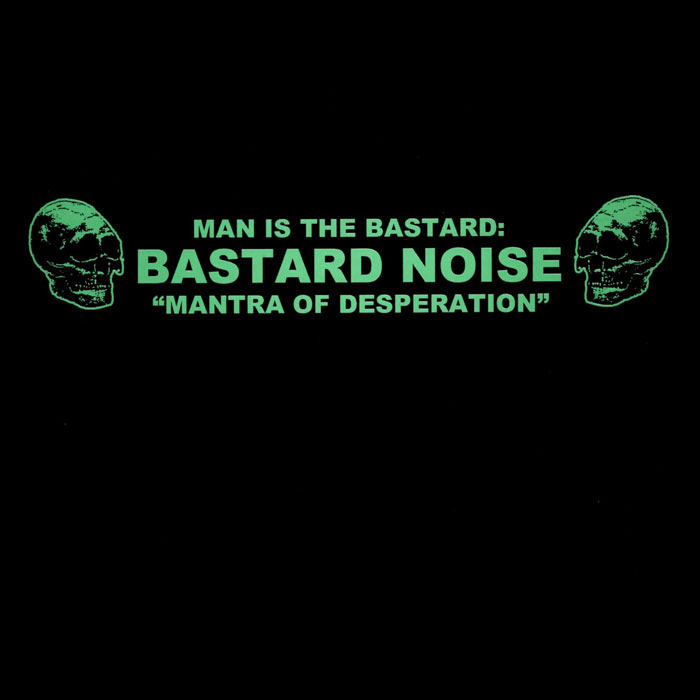Review: Bastard Noise ‘Mantra Of Desperation’
‘It’s just noise, isn’t it? Anyone could do it.’
I’ve harped on before about loving the range of art that being a Shaman reviewer exposes me to. A key part of this is the way that experiencing all this new and different music gets me thinking. Earlier this year I read David Novak’s book Japanoise: Music at the Edge of Circulation, not because I’m a noise aficionado, but quite the contrary; as a neophyte I wanted to understand the genre(s) better.

I trod a similar path with a more familiar trope, industrial, reading the fabulous, if somewhat in-thrall, England’s Hidden Reverse by David Keenan. Then, a couple of months ago, I found myself reviewing Bastard Noise’s Incineration Prayer/Self Righteous Suicide at the behest of The Shaman. It wasn’t a pleasant experience. And the conclusion that I came to was that that’s not a bad thing.
Here’s what I think (Warning: Opinionated Reviewer Ahead!). Often, and probably correctly, we listen to music to enjoy it. We can enjoy music and songs about or inspired by any subject – war, love, sadness, violence, psychosis, you name it; you pays your money and you takes your choice as the man said. And in enjoying the music, it makes us feel good, maybe it’s a release, it soothes our unhappiness, maybe it’s accompaniment to exercise that makes us more aggressive in our workout.
Probably ninety-nine percent of the time we choose to listen to music that reflects or engenders happiness, or, enjoyment. But what if the artist wants to communicate something that isn’t pleasant? What if they want us to appreciate, not necessarily experience, even momentarily, despair, hopelessness, despondency, the futility of disgust at the state of the world? How best to communicate the depth of these feelings? Write a song? With rhyming lyrics and a melody?
I don’t think so. No, I think a piece of art that truly sought (and achieved) the communication of this kind of emotion would sound very much like Mantra Of Desperation, Bastard Noise’s recent missive.
Let’s be clear, it’s not ‘just’ noise, and not everyone can do it. This is every bit as complex a piece of art as you’re likely to see reviewed on here. Eric Wood has composed and delivered a challenging piece of work that, for me at least, conjures some of the darkest parts of human existence, and this is a real skill. To be able to visit such intolerable corners of a human’s experience and leave is a gift provided through these two eighteen-plus minutes pieces of aural hell.
Eric Wood has composed and delivered a challenging piece of work that, for me at least, conjures some of the darkest parts of human existence…
I’m not a particularly brave fellow – I had a real sense of trepidation prior to pressing play and getting the required listening underway, but, committed to producing a review, and having been impressed by Wood’s previous work, I dived in, perversely choosing the second track The Rituals Of Human Waste as a starting point (The title swung it for me).
As if to prove that all noise pieces don’t sound the same, The Rituals Of Human Waste begins with a sound reminiscent of a Middle Eastern wind instrument, noting, for instance, like the excruciating frequencies with which Incineration Prayer starts. This is augmented by a deep, guttural vocal (I wish I could’ve worked out the ‘lyrics’) laid over a background drone that builds a sense of dread like a slow-paced aural horror film, until we’re subjected to a staccato, siren-like sound followed by what sounds like a short-wave radio scanning across a million untuned and incomplete signals. It’s the space around the noise that I really started to notice at this point. Not reverb or echo exactly, more organic than that, it does something, adds something, giving an aural context. It places the listener somewhere unpleasant.
Then, a sudden halt, and a sound building, like the tuning up of a demented orchestra. The sounds that follow conjure more of those dark places of the psyche alluded to earlier; static, a screaming that sounds painful, rogue electronic devices loading torturous, archaic programmes from tapes, programmes used by the demons in the machine to inflict the maximum possible misery.
Then, quiet. But no relief. I listened harder, desperate to know if there was something going on, a clue, anything that pointed to succour. But there was none. Once again, Wood’s work had left me rung out and deeply worried for the state of the World and the human experience therein.
It would be ignorant and churlish to overlook the emotional depth of this work. No, it can’t be hummed, or jammed on a down tuned guitar. Nor am I likely to throw it on in the car for company on a road trip. This is complex in both its construction and in the emotional response that it seeks to engender. I wouldn’t for a second presuppose what Wood wanted to communicate through his work, but if I’m anywhere close with what I’ve written here, he has achieved what he set out to do. And then some.
If you’ve read any of my previous work, you’ll know I’ve no interest in taking the reader through an entire tracklisting – I want to entice you to hear for yourself with fresh ears and no hand to guide you. Ergo, I’ll leave the second (first?) piece, Conditioned Death Addiction, to you. If you have the stomach for it.
Label: Alimentary Music
Band Links: Spotify | Instagram
Scribed by: George Green


